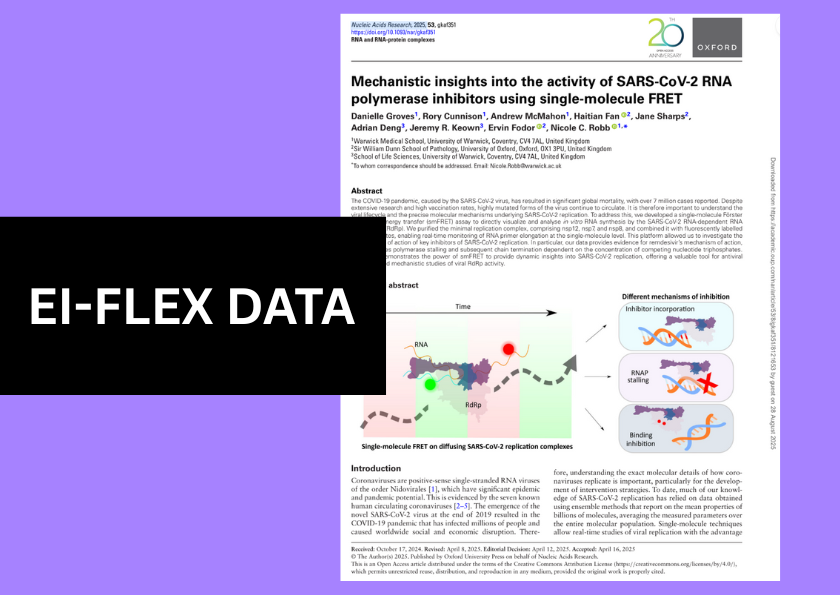Resources
Exciting Seminars
Discover how leading academics from around the world are using single-molecule fluorescence spectroscopy to further their research in this collection of seminars.
Featuring:
- Professor Shimon Weiss, UCLA & Bar-Ilan University
- Dr. Steven Quinn and Hermia Kung, University of York
- Dr. Paul Harris, Hebrew University of Jerusalem
- Professor Thorsten Hugel, University of Freiburg
- Professor Thorben Cordes, LMU Munich
- Professor Elizabeth Rhoades, University of Pennsylvania
- Dr. Joelle Goulding, University of Nottingham
- Dr. Nicole Robb, University of Warwick
- Professor Edwin Anthony, Saint Louis University School of Medicine
On Demand
We are on a mission to bring the power of single-molecule detection and characterisation to every lab

Download our single-molecule fluorescence spectroscopy ebook as a practical resource and source of inspiration
This 65-page ebook summarises our expert-led seminars into powerful articles, each showcasing how single-molecule spectroscopy is being used in practice to answer meaningful biophysical questions.

Request to join our single-molecule spectroscopy community
We've created a new place for asking questions, sharing knowledge, discussing research, having meaningful conversations, making new connections with fellow academics, and everything in between
Upcoming Events
Will we see you there?
- 🇨🇭 Protein Structure Determination in Industry: 9th – 11th November at the Hyperion Hotel, Basel
- 🇦🇹 Austrian Cryo-EM Symposium: 11th – 12th November at the Institute of Science and Technology Austria, Klosterneuburg
- Exciting Seminar | Mapping the global conformation of the Rag GTPase heterodimer with single-molecule FRET: 4pm GMT on the 20th November > register now
FAQs
Is the FLEX system suitable for my laboratory?
Is an optical table required?
The FLEX system does not require an optical table and our online diagnostic tools will ensure repeatable performance.
Is laser training required?
The FLEX system is a Class 1 laser product and may be used in a standard lab without specific laser training.
How do I analyse the data?
The FLEX software is easy to use. Our cloud-based data analysis and graphing tools are making single-molecule discoveries, at the push of a button, accessible to all users. Raw data downloads are available in HDF5 format to provide compatibility with all downstream data analysis software.
How flexible is the FLEX?
The FLEX system is built on the vision of Dr Timothy Craggs and the Exciting Instruments team to create an affordable, bench-top smFRET/FCS system capable of meeting the exacting needs and build standards of single molecule specialists, whilst maintaining the ease-of-use and accessibility suitable for the broadest range of academic and industrial users. The FLEX range is designed to grow with your lab, your research and your business. Please contact us to find out more about the FLEX range and how Exciting Instruments can support your laboratory and your research.
What are the advantages of making measurements in solution with single molecule sensitivity?
Understand every molecule
Plate-readers and traditional assay methods, such as ELISA, only provide information on the ensemble average of all molecular species present in a sample or within an assay. This can lead to imprecise measurements or inaccurate assumptions about how drugs, therapies, or ligands are interacting. The FLEX system uses single-molecule sensitivity and is therefore designed to provide information on the true distribution of molecular conformations and molecule-molecule interactions within a sample or assay. The FLEX system requires no immobilisation, enabling studies to be performed in more physiologically relevant environments and states.
What is the smRULER feature?
Single-molecule FRET is a powerful tool for the measurement of inter and intramolecular distances; however, it requires the determination of absolute FRET efficiencies. Our smRULER feature utilises ALEX (alternating laser excitation) combined with our smRULER calibration standards and straight-forward calibration protocols to overcome these issues and make absolute distance measurements simpler and more accurate! smRULER is designed to give you greater confidence in uncovering molecule conformations and in assigning conformations to different structural states.
A recent worldwide benchmarking study (Nature Methods 2018) has shown these methods for absolute FRET determination to be both precise and accurate.
What software features are included?
Real-time analysis with cloud connectivity
Our advanced software for the FLEX system utilises cloud connectivity to perform complex data analysis in real-time, allowing you to visualise your data as it grows, helping to support simple and fast assay validations which accelerate the decision-making process.
An interface for all users
- Fully equipped to perform complex data analysis in the cloud at the push of a button whilst providing HDF5 file downloads for further down-stream data analysis where required.
- An intuitive experimental profile builder and built-in calibration profiles means you can start making discoveries sooner.
- Our cloud connectivity makes your collaborations agile, enabling results sharing within research groups.
- Full metadata is stored with each experiment helping to support GMP and FDA 21 CFR Part 11 forward compatibility.
How long to does it take to run an experiment?
smFRET measurements typically take around 30 minutes and FCS measurements around 1 minute. Our software allows you to view experiment progress in real-time, speeding up the discovery process.
What probes can be used?
The FLEX system is compatible with a broad range of commercial probes which are suitable for traditional ALEX FRET measurements including Cy™, Atto-tec, Alexa Fluor, Janelia Fluor®, Fluorescent Proteins, CLIP-Cell™ and SNAP-Cell® fluorescent probes. We are constantly expanding the list of recommended probes, so please contact us for a list of our currently recommended probes for use with our dual excitation laser system.
What other modules/add-ons can I buy?
We are currently offering the following optional add-ons for the FLEX system:
- Temperature control (accurately control temperatures in the 25-45°C range)
- Blue Laser module
Expanding the FLEX system with features that will help you grow your research and your business is core to our vision. Please get-in touch and help us to do this.



